Riley smiled, paid his check, sauntered out into the street and caught a horsecar bound for Madison Square Garden. He got off at the corner of 50th and Eighth Avenue and walked upstairs to a handbook office over a radio repair shop. The bookie glanced at him, produced an envelope and counted out fifteen thousand dollars.
“Rocky Marciano by a TKO over Roland La Starza in the eleventh,” he said. “How the hell do you call them so accurate, Nat?”
“That’s the way I make a living,” Riley smiled. “Are you making book on the elections?”
“Eisenhower twelve to five. Stevenson—”
“Never mind Adlai.” Riley placed twenty thousand dollars on the counter. “I’m backing Ike. Get this down for me.”
He left the handbook office and went to his suite in the Waldorf where a tall, thin young man was waiting for him anxiously.
“Oh yes,” Nathan Riley said. “You’re Ford, aren’t you? Harold Ford?”
“Henry Ford, Mr. Riley.”
“And you need financing for that machine in your bicycle shop. What’s it called?”
“I call it an Ipsimobile, Mr. Riley.”
“Hmmm. Can’t say I like that name. Why not call it an automobile?”
“That’s a wonderful suggestion, Mr. Riley. I’ll certainly take it.”
“I like you, Henry. You’re young, eager, adaptable. I believe in your future and I believe in your automobile. I’ll invest two hundred thousand dollars in your company.”
Riley wrote a check and ushered Henry Ford out. He glanced at his watch and suddenly felt impelled to go back and look around for a moment. He entered his bedroom, undressed, put on a gray shirt and gray slacks. Across the pocket of the shirt were large blue letters: U.S.A.H.
He locked the bedroom door and disappeared.
He reappeared in Ward T of the United States Army Hospital in St. Albans, standing alongside his bed which was one of twenty-four lining the walls of a long, light steel barracks. Before he could draw another breath, he was seized by three pairs of hands. Before he could struggle, he was shot by a pneumatic syringe and poleaxed by 1½ cc of sodium thiomorphate.
“We’ve got one,” someone said.
“Hang around,” someone else answered. “General Carpenter said he wanted three.”
After Marcus Junius Brutus left her bed, Lela Machan clapped her hands. Her slave women entered the chamber and prepared her bath. She bathed, dressed, scented herself and breakfasted on Smyrna figs, rose oranges and a flagon of Lacrima Christi. Then she smoked a cigarette and ordered her litter.
The gates of her house were crowded as usual by adoring hordes from the Twentieth Legion. Two centurions removed her chair-bearers from the poles of the litter and bore her on their stout shoulders. Lela Machan smiled. A young man in a sapphire-blue cloak thrust through the mob and ran toward her. A knife flashed in his hand. Lela braced herself to meet death bravely.
“Lady!” he cried. “Lady Lela!”
He slashed his left arm with the knife and let the crimson blood stain her robe.
“This blood of mine is the least I have to give you,” he cried.
Lela touched his forehead gently.
“Silly boy,” she murmured. “Why?”
“For love of you, my lady.”
“You will be admitted tonight at nine,” Lela whispered. He stared at her until she laughed. “I promise you. What is your name, pretty boy?”
“Ben Hur.”
“Tonight at nine, Ben Hur.”
The litter moved on. Outside the forum, Julius Caesar passed in hot argument with Marcus Antonius, Antony. When he saw the litter he motioned sharply to the centurions, who stopped at once. Caesar swept back the curtains and stared at Lela, who regarded him languidly. Caesar’s face twitched.
“Why?” he asked hoarsely. “I have begged, pleaded, bribed, wept, and all without forgiveness. Why, Lela? Why?”
“Do you remember Boadicea?” Lela murmured.
“Boadicea? Queen of the Britons? Good God, Lela, what can she mean to our love? I did not love Boadicea. I merely defeated her in battle.”
“And killed her, Caesar.”
“She poisoned herself, Lela.”
“She was my mother, Caesar!” Suddenly Lela pointed her finger at Caesar. “Murderer. You will be punished. Beware the Ides of March, Caesar!”
Caesar recoiled in horror. The mob of admirers that bad gathered around Lela uttered a shout of approval. Amidst a rain of rose petals and violets she continued on her way across the Forum to the Temple of the Vestal Virgins where she abandoned her adoring suitors and entered the sacred temple.
Before the altar she genuflected, intoned a prayer, dropped a pinch of incense on the altar flame and disrobed. She examined her beautiful body reflected in a silver mirror, then experienced a momentary twinge of homesickness. She put on a gray blouse and a gray pair of slacks. Across the pocket of the blouse was lettered U.S.A.H.
She smiled once at the altar and disappeared.
She reappeared in Ward T of the United States Army Hospital where she was instantly felled by 1½ cc sodium thiomorphate injected subcutaneously by a pneumatic syringe.
“That’s two,” somebody said.
“One more to go.”
George Hanmer paused dramatically and stared around at the opposition benches, at the Speaker on the woolsack, at the silver mace on a crimson cushion before the Speaker’s chair. The entire House of Parliament, hypnotized by Hanmer’s fiery oratory, waited breathlessly for him to continue.
“I can say no more,” Hanmer said at last. His voice was choked with emotion. His face was blanched and grim. “I will fight for this bill at the beachheads. I will fight in the cities, the towns, the fields and the hamlets. I will fight for this bill to the death and, God willing, I will fight for it after death. Whether this be a challenge or a prayer, let the consciences of the right honorable gentlemen determine; but of one thing I am sure and determined: England must own the Suez Canal.”
Hanmer sat down. The House exploded. Through the cheering and applause he made his way out into the division lobby where Gladstone, Canning and Peel stopped him to shake his hand. Lord Palmerston eyed him coldly, but Pam was shouldered aside by Disraeli who limped up, all enthusiasm, all admiration.
“We’ll have a bite at Tattersall’s,” Dizzy said. “My car’s waiting.”
Lady Beaconfield was in the Rolls Royce outside the Houses of Parliament. She pinned a primrose on Dizzy’s lapel and patted Hanmer’s cheek affectionately.
“You’ve come a long way from the schoolboy who used to bully Dizzy, Georgie,” she said.
Hanmer laughed. Dizzy sang: “ Gaudeamus igitur ...”and Hanmer chanted the ancient scholastic song until they reached Tattersall’s. There Dizzy ordered Guinness and grilled bones while Hanmer went upstairs in the club to change.
For no reason at all he had the impulse to go back for a last look. Perhaps he hated to break with his past completely. He divested himself of his surtout, nankeen waistcoat, pepper and salt trousers, polished Hessians and undergarments. He put on a gray shirt and gray trousers and disappeared.
He reappeared in Ward T of the St. Albans hospital where he was rendered unconscious by 1½ cc of sodium thiomorphate.
“That’s three,” somebody said.
“Take ‘em to Carpenter.”
So there they sat in General Carpenters’ office, PFC Nathan Riley, M/Sgt Lela Machan, and Corp/2 George Hanmer. They were in their hospital grays. They were torpid with sodium thiomorphate.
The office had been cleared and it blazed with blinding light. Present were experts from Espionage, CounterEspionage, Security and Central Intelligence. When Captain Edsel Dimmock saw the steel-faced ruthless squad awaiting the patients and himself, he started. General Carpenter smiled grimly.
Читать дальше
![Альфред Бестер Star of Stars [Anthology] обложка книги](/books/398777/alfred-bester-star-of-stars-anthology-cover.webp)

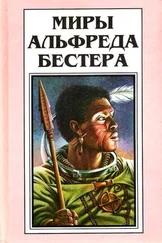
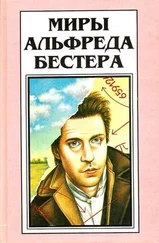
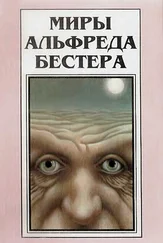
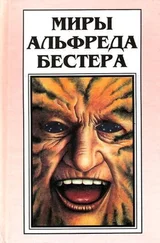

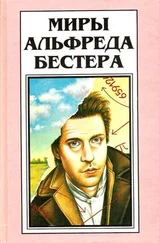
![Альфред Бестер - Миры Альфреда Бестера. Том 3 [Авторский сборник]](/books/405485/alfred-bester-miry-alfreda-bestera-tom-3-avtor-thumb.webp)

